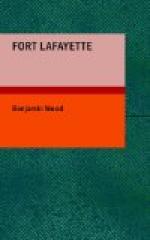“Can your armies be fed, clothed, and equipped without expense?”
“No. But all our means will be applied to military uses, and our operations will be necessarily much less expensive than yours. In other matters, we will forget our habits of extravagance. We will become, by the law of necessity, economists in place of spendthrifts. We will gather in rich harvests, but will stint ourselves to the bare necessities of life, that our troops may be fed and clothed. The money that our wealthy planters have been in the habit of spending yearly in Northern cities and watering places, will be circulated at home. Some fifty millions of Southern dollars, heretofore annually wasted in fashionable dissipation, will thus be kept in our own pockets and out of yours. The spendthrift sons of our planters, and their yet more extravagant daughters, will be found studying economy in the rude school of the soldier, and plying the needle to supply the soldiers’ wants, in place of drawing upon the paternal estates for frivolous enjoyments. Our spending population will be on the battle-field, and the laborer will remain in the cotton and corn-field. There will be suffering and privation, it is true, but rest assured, Harold, we will bear it all without a murmur, as our fathers did in the days of ’76. And we will trust to the good old soil we are defending to give us our daily bread.”
“Or if it should not,” said Oriana, “we can at least claim from it, each one, a grave, over which the foot of the invader may trample, but not over our living bodies.”
“I have no power to convince you of your error,” answered Harold. “Let us speak of it no more, since it is destined that the sword must decide between us. Beverly, you promised that I should go visit my wounded comrades, who have not yet been removed. Shall we go now? I think it would do me good to breathe the air.”
They prepared for the charitable errand, and Oriana went with them, with a little basket of delicacies for the suffering prisoners.
CHAPTER XXV.
It was a fair morning in August, the twentieth day after the eventful 21st of July. Beverly was busy with his military duties, and Harold, who had already fully recovered from his wounds, was enjoying, in company with Oriana, a pleasant canter over the neighboring country. They came to where the rolling meadow subsided into a level plain of considerable extent on either side of the road. At its verge a thick forest formed a dark background, beyond which the peering summits of green hills showed that the landscape was rugged and uneven. Oriana slackened her pace, and pointed out over the broad expanse of level country.
“You see this plain that stretches to our right and left?”
“Of course I do,” replied Harold.
“Yes; but I want you to mark it well,” she continued, with a significant glance; “and also that stretch of woodland yonder, beyond which, you see, the country rises again.”




